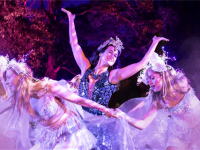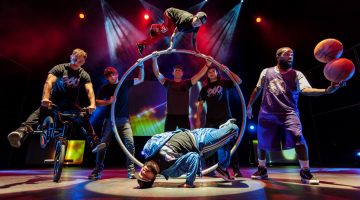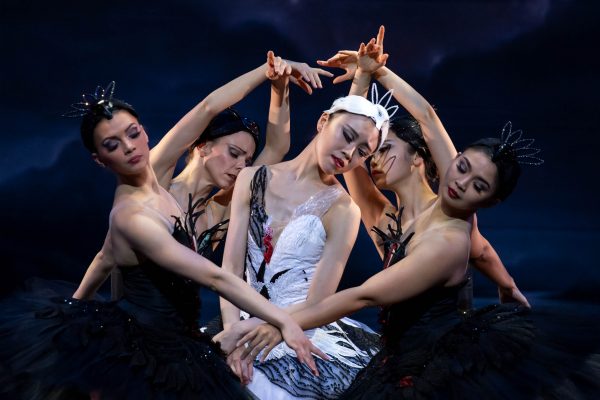
West Australian Ballet “Swan Lake”
18th November 2022 at His Majesty’s Theatre, Perth
Reviewed by Courtney Allen
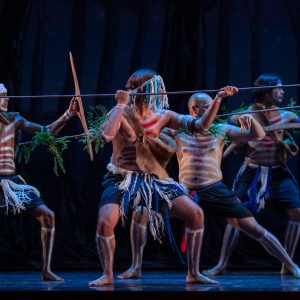
It may seem strange to begin at the end, in reviewing WA Ballet’s world premiere of their innovative recreation of Swan Lake, but upon seeing the tripartite embrace at curtain call between Artistic Director Aurélien Scannella; choreographer Krzysztof Pastor; and Noongar Artist, Leader & Guide, Barry McGuire; the profundity of the evening’s production crystallises. The WA Ballet dancers lift their arms in grateful applause and the young dancers of Gya Ngoop Keeninyarra (One Blood Dancers) are taking in the moment. There are embraces and there are tears. The audience is in rapturous applause. The urgency of the words spoken in the Welcome to Country prior to the show resonate here: a call to open minds and hearts. Something truly creative, iconic and sacred has taken place on stage this evening and as the audience, we have had the privilege of witnessing it.
The anticipation surrounding WA Ballet’s new offering, Swan Lake, has been palpable and has been building for a number of months. When the ballet was first announced as the pièce de résistance of the 2022 program, reviewers and ballet audiences alike were animatedly discussing a first for WA: a newly choreographed Swan Lake, which would include and be guided by Noongar elders, dancers and voices, to recreate the work in the context of traditional Noongar stories, song and dance. While the new ballet would recognise its classical tradition, it would be reimagined for Western Australian audiences in 2022 and it would have something significant to say.
It is an absolute delight to see this collaborative vision brought to life. Barry McGuire’s role in the production as Special Guest Artist, Noongar Leader and Guide, brings to the stage the character of Boodja Wiirrn, the Spirit of the Land: using voice, dress, instruments and kaartdijin (knowledge) to wrap the production in a cloak of warmth, awe, and wonder. Mowadji (Special Guest Artist, Kyle Morrison), a Noongar Elder who attempts to bridge cultures and acts as a mentor to Sebastian, leads the group of young Noongar dancers in mesmerising Aboriginal dance which expertly weaves in and amongst elements of traditional repertoire (including Dance of the Cygnets) and Krzysztof Pastor’s new classical choreography. Morrison’s work is always astonishing in both craft and execution, and his venture into the often cloistered world of classical ballet is exciting. I hope he’ll be back.
It would be remiss of me not to mention the presence of a central character in the ballet and totem of the Noongar Beeliar, the people of the Swan River: the Black Swan. The narrative shifts in this production to tell a tale that takes place in 1880’s Waylyup (Fremantle) and while the original Black Swan of the classical canon remains in the character of Odile (though transformed from an evil seductress to a colonial capitalist), the corps is also entirely made up of black swans who depict very different qualities. This paves the way for the Noongar story of how the swan got its black feathers to take centre stage. Phil R. Daniels’ set design takes us to a range of scenes that are both familiar and historically located, from the banks of the Swan through to the Government House Gardens (depicted through an impossibly detailed backdrop), all of which aid in the gentle repetition of the symbolism of the black swan.
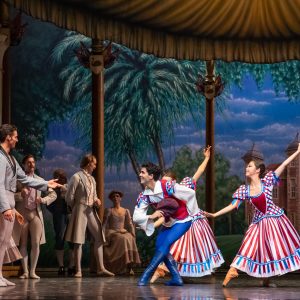
Oscar Valdes’ performance as Sebastian Hampshire is as elegant as it is elegiac. From the first meetings of both Odette (the ever-thrilling Kiki Saito) and Odile (Chihiro Nomura, in terrifying and beguiling brilliance) we are aware that he is haunted by two loves in a case of mistaken identity, but most of all that the haunting comes from within: the tyranny of human choice and the responsibility we must take for our actions.
Like anyone else, I am always enthralled by Tchaikovsky’s score which is miraculously fresh upon every listen, with credit to the West Australian Philharmonic Orchestra, expertly led by Conductor Jessica Gethin. Kiki Saito’s Dying Swan does it justice and a shiver runs through the audience: the collective exhalation of a theatre of broken hearts. However, the history story of how the black swan got its feathers is ultimately warm-hearted and this is where the live music performed by Barry McGuire really points towards the narrative heart and soul of this newly realised ballet.
I’m sure I wouldn’t be alone in continuing to hear the words of the evening’s Welcome to Country in the context of this spectacular and meaningful work. In particular: the call to turn our minds towards the upcoming referendum for a constitutionally enshrined Indigenous ‘Voice to Parliament’. These words linger, long after Tchaikovsky’s score has faded. They are the perfect compliment to this collaborative and future-propelling vision of Swan Lake. Barry McGuire’s message is that after the sharing of this work, this is now a story that we can all tell.
Don’t miss out on tickets to WA Ballet’s 2022 season of Swan Lake, an iconic and contemporary local recreation of one of the most beloved classical masterpieces of history.

